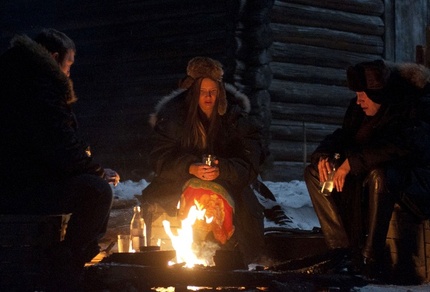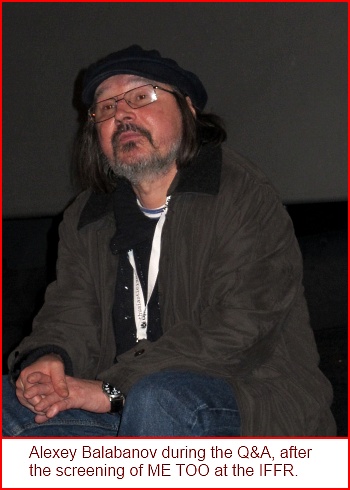IFFR 2013 Review: ME TOO Is Balabanov's Final Wave To Us All

Russian director - and enfant terrible - Alexey Balabanov wasn't exactly a stranger at the International Film Festival Rotterdam. Nearly all of his films were screened at this festival upon release, often with the director present. This year was no exception: Balabanov was in town and so was his newest film, Ya Tozhe Khochu, known in the West as Me Too.
As long as ScreenAnarchy has been covering the IFFR we've been trying to get an interview with Balabanov, but the man was never interested. He only did a few interviews each year anyway, and those were with local printed press. But this year Alexey Balabanov proved particularly elusive. The rumors amongst press and industry were that this was because of health reasons, and that Me Too was going to be his last film. Which came as a shock because he was only 54 years old.
When I saw Me Too, I wasn't sure how much of this backstory to include in the review. It was rumor after all, and I didn't want to mention any of this without official corroboration. In the end this got me so tangled up that I decided against reviewing it at all.
Until earlier this week, when it became known that Alexey Balabanov indeed died in a sanatorium just outside of St. Petersburg, the rumors about his poor health apparently containing enough truth.
Why is this so important for the review? Because Me Too is very much a film about dying. During the Q&A in Rotterdam, Balabanov stated that this was his most personal film, and no kidding (slight Spoiler Alert): he is in it himself, as a somewhat famous European arthouse director. Who is dying.
So what did I think of it? Read on, but first...
The Story:
Somewhere in Russia there is a chapel. A strange, rapture-like disaster happened there, spiriting away most of the village's population, and plunging the surrounding countryside into a nuclear winter, covered with deadly radiation.
Legend has it that the chapel still spirits up people on occasion, to instant happiness. Therefore pilgrims keep trying to reach the chapel. But you never return: those who reach the chapel either are spirited up, or die of the radiation. And there is no telling who is chosen and who is not...
One day, several misfits decide to just take a car, go to the chapel and reach happiness or die trying. Among the people in the group are: a mafia hitman, a musician, an old man, a prostitute, and, sometimes, a prophet. Which of them will make it to happiness?
 The Movie:
The Movie:
A strange secluded bit of countryside, guarded by military, with only decaying ruins within and a God-like miraculous entity which people try to visit ... sound familiar? You'd be forgiven for spotting more than a few similarities with Andrei Tarkovsky's Stalker at this point.
But, during the Q&A after the IFFR screening, Balabanov denied that Stalker was an inspiration. In fact, he said he found Tarkovsky's film, and the book it was based on, to be terribly boring.
And indeed, the director of Me Too seems to aim at different targets here than the director of Stalker did. The characters in Me Too do not have a wish to be fulfilled or a question to have answered. They are just fed up with their lives so far, and want happiness, no matter how nondescript it is. The title refers to the standard answer the misfits get whenever they say they're looking for happiness. "Me too!" everyone replies.
There is no deep soul-searching in these characters, either. Most can be pegged in seconds as "sympathetic," or "braggart," or "hooligan," and throughout the film they will not break these molds. These people aren't looking for change, they are looking for an ending. The chapel to happiness is a "get-out-of-jail-for-free" card to them, and the price of failure is an acceptable death.
All this makes Me Too sound like a terribly gloomy film, but it is to Alexey Balabanov's credit that the film never becomes leaden. In truth, it plays more like a comedy than as a statement about finality. The dry irony of the characters lightens the mood, as does the total lack of sentimentality. Nobody dwells on their own misery, because the trip guarantees an outcome where there is no longer any misery. And on the way to the end, you can get by on booze and jokes.
That also means there isn't a big narrative arc here. Balabanov raises some questions about belief and relief, and who deserves either, but the answers are, of course, just his opinion, not truths. The film isn't exactly unapproachable, but neither did it enthrall me. Who does Balabanov grant happiness, and who gets just stuck with (just) death? It is the one question which makes you see the film through to the end. As the characters start to approach their final destination, the landscape gets increasingly beautiful, but also increasingly littered with the corpses of those who didn't make it.
During the Q&A, someone asked Balabanov if he thought that he himself deserved happiness. He answered: "No, I've killed so many people in my movies..." and the whole audience started to laugh. A fitting end to this screening.
Conclusion:
While it is not Balabanov's strongest film, there is a lot to like in Me Too. The film is witty, not as bitter as you might expect and frequently beautiful.
The audiences in Rotterdam thought so as well and awarded the film a 3.4 out of 5.

Do you feel this content is inappropriate or infringes upon your rights? Click here to report it, or see our DMCA policy.






